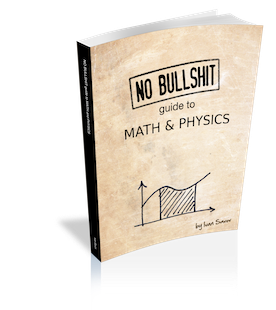The page you are reading is part of a draft (v2.0) of the "No bullshit guide to math and physics."
The text has since gone through many edits and is now available in print and electronic format. The current edition of the book is v4.0, which is a substantial improvement in terms of content and language (I hired a professional editor) from the draft version.
I'm leaving the old wiki content up for the time being, but I highly engourage you to check out the finished book. You can check out an extended preview here (PDF, 106 pages, 5MB).
differential calculus
The study of continuous change in a single variable. Limits, derivatives, maximization and problem solving. Extremely important to physics and many other sciences. First part of the minimum calculus course.
books: any calculus book should do. Exercises with solutions recommended.
depends on: basic functions, basic algebra
reverse depends: everything depends on this stuff!
integral calculus
The second part of the minimum calculus course. It covers the fundamental theorem of calculus, sequences, series, anti derivatives, integrals and integration techniques. L'hopital's rule.
books: any calculus book should do. Exercises with solutions recommended.
depends on: differential calculus,
reverse depends: everything depends on this material!
linear algebra
The solution of systems of linear equations, matrices, vectors and analytic geometry are covered in a unifying manner. Key element to understanding many concepts and expanding one's way of thinking.
books: any linear algebra book. Anton is decent.
depends on: basic algebra, basic geometry
reverse depends: core element, everything depends on it.
differential equations
Some real world problems provide us with differential relations. I want to find out f but I only have information about the df/dt (the change in f). With the techniques of differential equation solving one can find out solutions (find f). For simple problems integration is enough but for more advanced situations a structured approach is needed. The course is more of a cook-book then anything else. You look at the ingredients and the recipes you know how to cook and you give it you best shot….
books: many good books. Avoid books with "for engineers" in title.
depends on: differential calculus, integral calculus, linear algebra
reverse depends: mechanics, partial differential equations,
multivariable calculus
The study of calculus in several variables. The concepts of limit, derivative, integral are reexamined in the context of numerous (usually 2 or 3) variables. The complexity is trivial if the dependencies have been well mastered.
books: any calculus book. Material is standard.
depends on: differential calculus, integral calculus
vector calculus
Application of the ideas of calculus to vectors in 2 or 3 dimensions. Techniques like path integration, surface integration, volume integration are taught permitting the student to learn Gauss' Divergence Theorem and Stokes Theorem.
books: any vector calculus book. Some will not cover the advanced topics well.
depends on: differential calculus, integral calculus, linear algebra, multivariable calculus,
reverse depends: electromagnetism, thermodynamics
PHYSICS
classical mechanics
description : Mechanics starting from Lagrange's equation of motion. Using the techniques
of Variational Calculus and virtual displacements arrives at an alternative
form of mechanics. More advanced topics include
form of mechanics. More advanced topics include
books : Goldstein, Hand,
depends on : calculus, linear algebra, newtonian mechanics, variational calculus
reverse depends : quantum mechanics, quantum theory, paricle physics, solid state physics
quantum mechanics
description : The study of the subatomic world, as described by vectors in Hilbert space. The big fuss about QM is the very small scale you simply can't know the x_i and v_i of some particle. What can you know then? Well you can know x_i or v_i, just not both at the same time. The tools for doing physics with electron spin, atoms and photonss are linear algebra and probability theory. If you want to analyze some real world systems (like the energy levels of the electron around the Hydrogen atom) then brace yourself for double integrals over spherical harmonics. I recommend you first learn matrix QM and then move on Schrodinger eqn, Hamiltonians and real-world physical systems.
books : Sakurai
depends on : calculus, hamiltonian mechanics, modern physics, linear algebra
reverse depends : intermediate quantum mechanics, quantum theory, paricle physics, solid state physics
advanced quantum mechanics
description : Find the state of some system given just its Hamiltonian (how the parts of the system interact) is a serious task. More advanced topics like perturbation theory, symmetries, two body systems and developing a more sophisticated language by using the diract notation. Links to classical as the limit of the Hamilton-Jakobi equation.
books : Sakurai, Landau
depends on : elementary quantum mechanics, hamiltonian mechanics, linear algebra, groups
reverse depends : quantum theory, paricle physics, solid state physics
